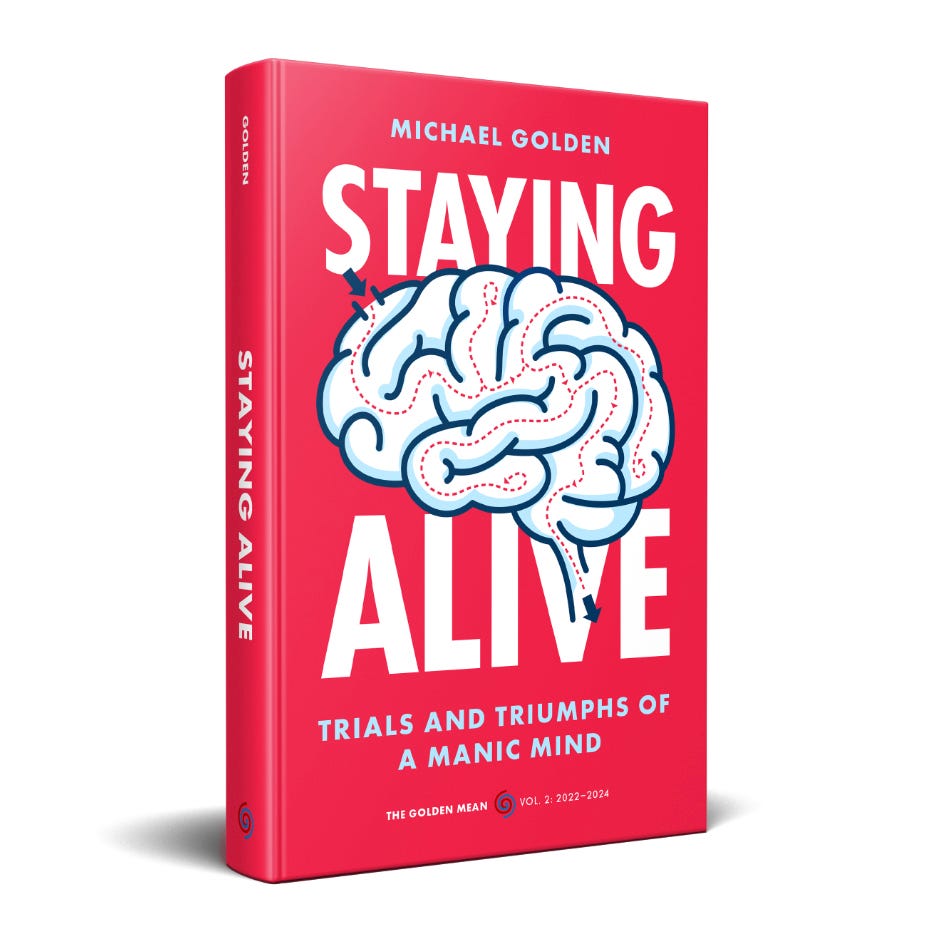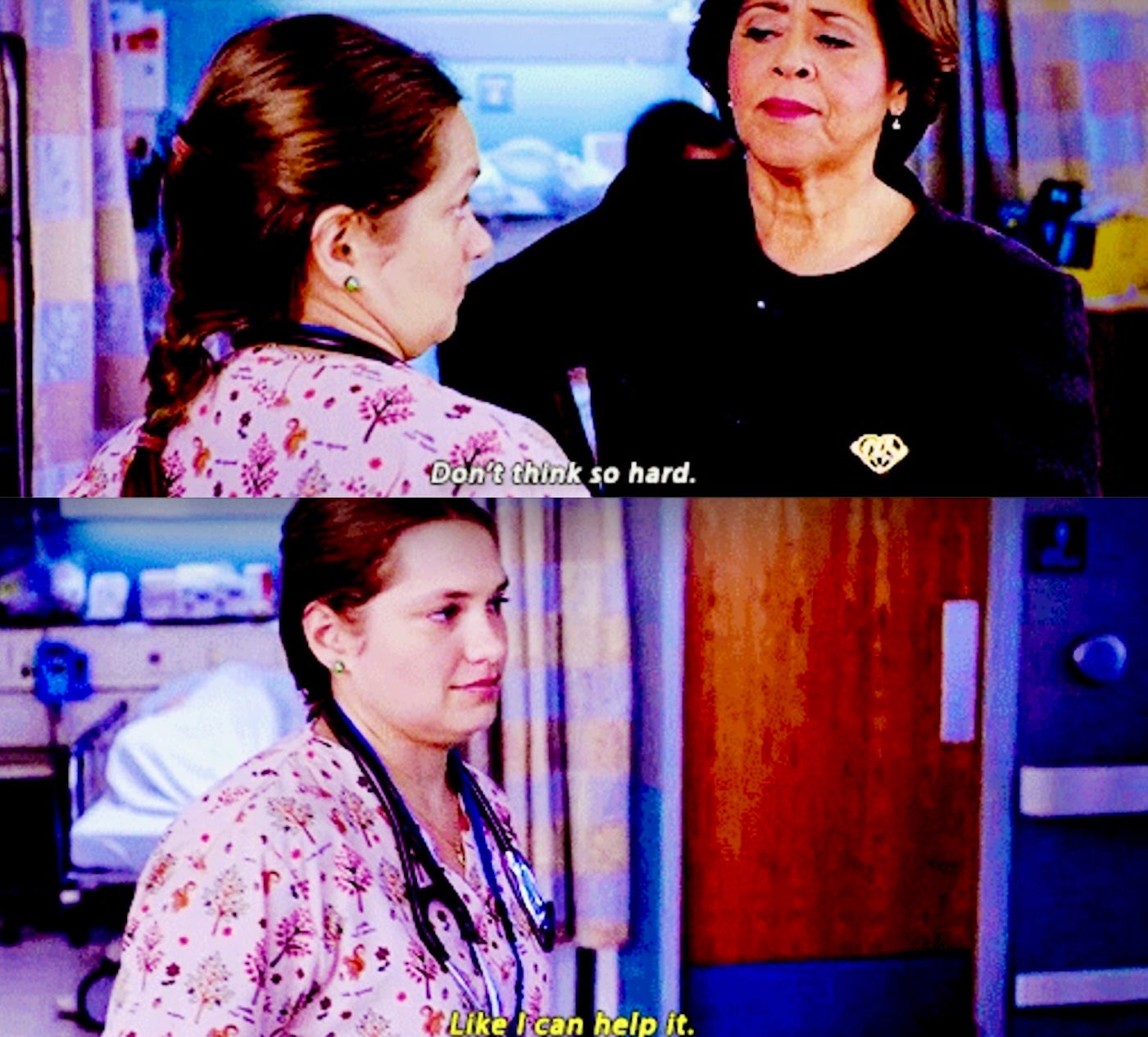Lend Me Your Mind
"Whatever events may be driving my latest mental frenzy, when my consciousness can take a step back, slow it down and see how silly or wrongheaded my thoughts are, it can bring tremendous relief."
This Introduction is excerpted from Michael’s new anthology, STAYING ALIVE. To get a free E-Copy and ALL posts from The Golden Mean in 2025, SIGN UP TODAY at TGM’s reduced annual price!
INTRODUCTION
On the first page of the first chapter of Write or Die, I described the first time I ever experienced the pain of acute depression:
“Paralyzed in a darkened bedroom, I felt like an inmate and a guard at the same time. My body hurt all over, yet I’d suffered no physical injury.”
That episode happened seven years ago, and it stretched out for months. I was 51 years old.
A nearly identical fog of desperation enveloped me about three years later, but it only lasted a few weeks. I learned from it, and ended up feeling mentally stronger as a result. But at the very same time, it dawned on me that no matter how many nuggets of wisdom I might accrue along life’s path, there was no guarantee I would not be victim to a third event. Or a fourth. Or a…
In Write or Die, I included dozens of opinion columns I’d written on a wide range of subjects, including politics, race, justice, sports, journalism, as well as stories about people who had compelling experiences to share.
But without question, the chapter that resonated most with readers was the first one: “Crashing and Rising” — about my own mental health struggles and some of the lessons I’d taken from them. I heard from folks who said that they or someone they knew identified with the kind of misery I was describing. It made them feel less alone. Even hopeful. That was a good thing.
The impact those stories had on readers motivated me to focus far more of my writing on the subject of mental health. But in Staying Alive, you’ll see it broadened into an investigation of how and why I think the way I do. Exploring and revealing that part of me meant going deeper into a place that I had not always wanted to explore.
MY “MANIC” MIND
When I shared the cover art for this book with a dear friend of mine, she objected to the “manic mind” phrase in the subtitle. When I asked her why, she answered:
“Michael, I don’t like it when you use the word ‘manic’ to describe yourself. It makes me uncomfortable. ‘Manic’ makes me think of crazy. Like, a real nut job. You are in no way crazy.”
Notwithstanding my belief that we’re all a little (or a lot) crazy — or choose your preferred descriptor — I was grateful for my friend’s observation. In fact, I started to ponder whether the literal definition of “manic” strayed from what I was intending the word to express. Was it just semantics? Does it matter? The fact that these questions are constantly rolling around my head may offer the answer! But being a stickler for accuracy, I turned to my friendly dictionary:
manic (adjective)
- showing wild, apparently deranged, excitement and energy
- frenetically busy; frantic
Nice to meet you. That’s how it feels to be inside my head much of the time. Ordinarily, I can manage it pretty well. But when I fall into life circumstances that allow the gears to jump into overdrive, my manic thoughts can drive some pretty negative feelings.
What I’ve learned, however, is that when I can take notice of this as it’s happening, it opens an opportunity to slow my thoughts down and make better sense of them. Whatever events are driving the latest frenzy, when my consciousness can take a step back and see how silly or wrongheaded my thoughts are, it can provide tremendous relief.
To be clear, I’m not exclusively talking about the angst and agony that come with gnarly cases of anxiety and depression. In Staying Alive, you’ll read about plenty of everyday challenges my mind goes up against — many of which I’m not even aware of until after the fact.

Whether it’s excessive self-criticism or the madness of comparison or facing up to long-held fears — I know that everyone can identify with these brain battles we all engage in. Understanding not only ourselves, but also one another, is a huge part of the human experience.
We share this world. We have the choice to share our minds. Sharing my own has been the healthiest thing I’ve ever done.
HOW TO READ THIS BOOK
Staying Alive is an anthology of 41 separate articles I’ve written over the past three years, many of which have not been published before. Because it is a compendium, you will notice some overlapping story elements in various pieces, as well as some jumps around in time.
Whether an article is a reflection of my own inner monologue, a life experience, or musings on personal interactions I’ve had with others, the common theme is my effort to better understand my mind. And hopefully give you a better picture of yours.
At the same time, I’m always trying to learn about other people’s minds. I’m often inspired by how they live their lives and the words of wisdom they pass on. I love the challenge of trying to tell their stories with a creative approach that delivers a practical takeaway.
So buckle up. From self-flagellation to self-reflection to self-knowledge — with some surfing and skydiving in between — you’re about to take a topsy-turvy ride through this manic mind of mine. You’re also going to hear about some true comebacks and some big wins — even a few epiphanies…
In the TV series Nurse Jackie, there’s a short exchange that well sums up the challenges we all face, to varying degrees, as we try to manage our minds. The sarcastic and very direct hospital administrator, Gloria Akalitus, replies to an annoying question from the quirky nurse Zoey:
“Don’t think so hard.”
After Akalitus walks away, Zoey, in her typically dry sense of humor, mutters four true words to no one in particular:
“Like I can help it.”
I know how she feels. Maybe you do too.
Yet sometimes we can help it. Even find ways to turn it on its head — and to our advantage. This book is about sharing a few of the ways I’ve learned how to do so.






